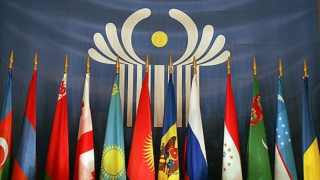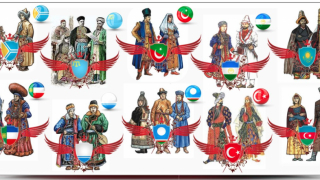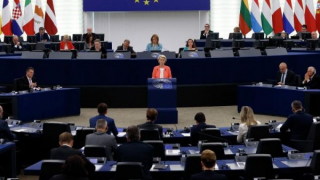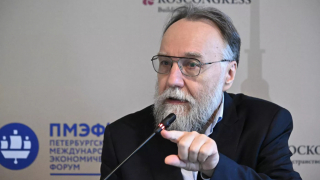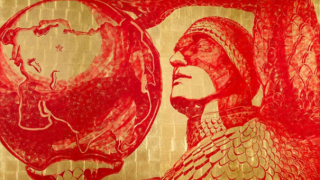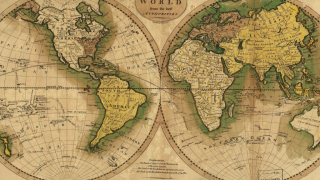Rectification of Names as the Main Principle of Ideological Struggle
As philosophers, we are expected to come up with a conceptual scheme that might work. Political strategists usually work with ready-made concepts, as do journalists and political scientists. They don't create them. This is the philosophers' job - to create concepts. By and large, they don't even have to be created from scratch, because Russian thought and the history of Russian philosophy as a whole is extremely rich. We have a lot of untapped conceptual resources that we can use to get where we need to go.
The first problem I would like to point out is that, as historical experience shows, it is impossible to win an ideological information war from a defensive position. In an ideological war, there has to be a paradigm of the attack. Using the defense paradigm, it is better not to start this war, it is already lost. He who attacks first wins in an ideological war.
Since the time of Ivan the Terrible, Russia has been waging an ideological war with the West. Unfortunately, it almost always defends itself. It never attacks. The myths about Ivan the Terrible (about his tyranny, etc.) were created in the 16th century and they still exist today. Moreover, scholars continue to reproduce them without even mentioning where it all came from. In fact, the myths date back to the Russophobic pamphlets of the time and are completely untrue. In my opinion, Ivan the Terrible was not an ideal ruler, but in any case, 90% of what is said about him is absolute nonsense. Ivan the Terrible was the greatest humanist against the background of the horrors that happened in Europe at that time.
As a matter of principle, an ideological war cannot be won from a defensive position. If we defend ourselves, we are already at a loss, there is nothing more we can do, the result will be the same. All we have to do here is to attack, to blame and to denounce, and never to justify ourselves, even in the cases when Russia is really in an unpleasant situation. As you know, only he, who does nothing never errs. He who does something inevitably errs. It's only natural. Man is not God, he is sinful and often errs. But when we are waging an ideological war, we mustn't admit our mistakes. Presenting one's mistakes as one's achievements is one of the elements of mastering ideological warfare.
In the modern world, the West is dominant not only in the economic and military realms, but also in the ideological realm. The West wages an ideological war not only against Russia, but also against the rest of the "non-West" world. This is its true adversary. For them, Russia is a matter of a situational context of conflict. In general, the West fights against the "non-West", including within itself, when alternative cultural forces arise there, and it suppresses them because, from its point of view, they are "non-Western". The 20th century is clearly the century of the ideological victory of the West. One of the secrets of this global victory was that the West never admitted its mistakes. "Mistakes" is an understatement. They never admitted their crimes; moreover, they always presented their mistakes and crimes as outstanding achievements, and people began to believe it. A well-known psychological pattern is that if a person is called a camel twenty times in a row, he will call himself a camel on the twenty-first occasion. As a result, people began to believe even in the most blatant lies of the West.
One of the secrets of ideological warfare is never to admit one's mistakes, never to show remorse, but only to accuse and denounce. That's what the West has always done, that's how they have won. The most heinous lies of the West, and there is an endless list of them, have always been a great asset to the West because people believed them. I'm not saying that we should act symmetrically and become like the West, because then the struggle against the West will lose all meaning and we will become like them. What is the point of fighting with them when we are their mirror image? Obviously we cannot do the same, but the fact is we must understand what to discard and what to keep. What is necessary is to follow the very principle of the attack paradigm. Justification is already defeat.
In real war and combat, retreat often saves troops: They don't die surrounded, they retreat, they defend, they exhaust the enemy. Defending is often a very profitable way to get fighting done. It's totally the opposite when it comes to an ideological war. The defense always loses. There is a big difference. It is not its lies that the West needs to borrow, but this most powerful strategic discovery: they never apologize for anything, to anyone; they are always right and always blame everyone else. This principle must be fully adopted, if we do not do this, we will lose. We have to counter them with the same thing: they should smash against us like a forehead against a wall. We should meet with reciprocal symmetrical actions, the same accusations and denunciations all their attempts to humiliate, accuse and slander Russia. All of what we conceptualize is meant to be offensive.
There has been a lot of talk lately about the concept of the "Russian world". This concept was coined by the Russian historians of Malorossia in the middle of the 19th century and concerned the period of feudal fragmentation in Russia. It is quite correct from a scientific point of view. Indeed, Russia was not united as a state during the period of feudal fragmentation. It was united as a world, as a kind of cultural and civilizational (post-Byzantine) phenomenon. It was a right concept. In the 20th century (and especially now, at the beginning of the 21st century) the concept of the "Russian World" acquired an ideological meaning and began to be actively used in the ideological struggle. But the fact is that it is correct only for the internal audience: for Russians and that part of the inhabitants of Ukraine who understand that they are Russians too. As soon as the concept of "Russian World" reaches the international audience, our opponents immediately recode it very successfully and effectively.
About a month ago, the Polish Prime Minister said that the "Russian World" is a monstrous ideology, comparing it to Hitler's fascism, Soviet communism and Stalinism. For them, it's all the same - different kinds of totalitarianism. In their opinion, the "Russian world" is another monster that has crawled out into the light and must be destroyed, a successful label sewn with the attributes of another totalitarian, anti-human ideology. Nothing needs to be invented, they already have a proven behavioral model. It works in an automatic way, and these patterns fit perfectly into the mass consciousness of the West. They made a scarecrow out of the "Russian World". Therefore, the term "Russian World" does not work in this case; it is easily recoded and used against us. What works well for our internal audience (within our cultural and informational space) does not work externally, for a global audience.
We must have terms that cannot be interpreted arbitrarily. These are terms that already have a certain amount of unambiguous meaning in the words themselves. In the history of Russian thought I have found several good concepts that we could use, and in my opinion the most effective from the point of view of ideological warfare is the concept of "dictatorship of conscience" introduced by the Russian thinker Ivan Solonevich. He tried to decipher the mystery of the Russian monarchy: why it was able to create a great power on one-sixth of the land and how it differed from Western versions. He discovered the main feature that was not present in other types of monarchies. He called it "dictatorship of conscience". This concept is very rich and includes many aspects, which are very well described and confirmed by many empirical facts in his book "People's Monarchy".
It seems to me that it is possible to combine this term with the concept that our President recently introduced when he referred to the West as an "Empire of Lies". This term is a symmetrical response to Reagan, who once called the USSR the "Empire of Evil". In my opinion, it makes sense to adopt the term "Empire of Lies" and to introduce it into popular and journalistic discourse. In fact, it is the United States that should be called an "empire," which very successfully refutes its myth of itself as a democratic country. The USA is trying to establish a totalitarian dictatorship on a global level. The word "empire" has a very powerful revelatory meaning in reference to them. This is truly an empire that seeks to control the globe through financial, military, and ideological brainwashing.
If we take Western civilization as a whole, then we can use the term "Civilization of Lies". This is also a very powerful blow to the brains of the global audience. It is so because the West has always positioned itself as the educator and bearer of the true image of the world, which should be assimilated by everyone. Either you assimilate the Western image of the world, or you are barbarians, savages and totalitarians who need to be enlightened and, if necessary, bombed. The very principle of conversation changes radically if we first define the entire Western worldview as a lie. It is no longer an excuse, it is an accusation, and the accusation and the denunciation are so fundamental that after it there is no point in discussing any particular issues, i.e. what is happening in Ukraine or anywhere else. These are already private matters, which in principle do not matter. We are going to destroy their sense of self, their image of the world, and their idea of themselves. If they are initially a lie, their whole picture of the world is a lie, their principles are a lie, their values are pseudo-values, anti-values, then from that moment on they are forced to defend themselves. We are putting them in a position of defense.
Ivan Solonevich spoke of the "dictatorship of conscience" as the principle of the Russian monarchy that existed until 1917. Actually, the principle of monarchy and the system of the state are of secondary importance here. The structure of the society itself, a certain social ideal, and a way of life in general are of primary importance. Therefore, the Orthodox Russian civilization can be defined as a "Civilization of Conscience".
It is worthy of note that one should not be blindly obedient to one's conscience. Conscience can be wrong. For example, Fyodor Dostoyevsky said that conscience without God is horror; conscience without God will reach sadism, murder, and consider it right. We have seen that in the 20th century many very conscientious people supported an ideology that led to the murder of millions. Conscience itself is not to be idolized, it is not to be regarded as something higher. Conscience is not God. But the fact of the matter is that the category of conscience itself has a very powerful effect on the brains of our opponents. If we call ourselves a "Civilization of Conscience" and the West a "Civilization of Lies," we are forcing them to defend themselves from extremely unfavorable positions. If we have declared everything they say to be a lie in advance, then they have to build their picture of the world from scratch, justifying it in every detail. This is very difficult to do. Before, we were forced to create our own image of the world, to defend ourselves and to fight accusations, and now they are doing the same.
All this will only work if such concepts are included in the official discourse, if they are massively applied, if they are known to everyone, if they become linguistic trademarks. The concept only works if it becomes an idiom everyone knows and uses. When such concepts as "Empire of Lies" and "Empire of Conscience" enter the language at the level of idioms, it will be a completely different conversation not only with the West itself, but also with representatives of the West in Russia. We need to fundamentally change the discourse and position in the conversation.
The concepts of "chimera" and "antisystem" introduced by Lev Gumilev are perfectly suitable for our purposes. The chimera can be characterized as a community of de-ethicized people who have fallen out of the ethnic groups. This is a society with a negative view of the world. Ukrainian ideology has been the training ground for people with such attitudes for thirty years. We wonder where this hatred of Russia comes from. But the point is that this hatred is secondary - hatred of everything in general was brought up there, a negative view of the world in its purest form, self-consciousness of an ethnic chimera (anti-system). "Ethnic chimera" is an absolutely scientific term, and in this capacity it works perfectly not only in relation to Ukraine, but also in relation to an infinite mass of historical phenomena. This is an ideological concept that we can use quite effectively.
If radicalized to the level of journalism, then Ukraine can be called "anti-people". Ukrainians are Russians who have forgotten that they are Russians, but they have forgotten not by themselves. They have been brainwashed for thirty (and in reality more than a hundred) years. A Ukrainian is a Russian who has come to hate his own people, himself, and in this sense, Ukraine is an "anti-people".
It is my opinion that very harsh terms can be applied to the Ukraine. Everything should be symmetrical. The terms "anti-human" and "chimera" can be applied without remorse. We are a "Civilization of Conscience". We should not lie. We have to act in accordance with the rules of the ideological warfare that really work.
Translated by Daria Seregina and Sophia Polyankina


